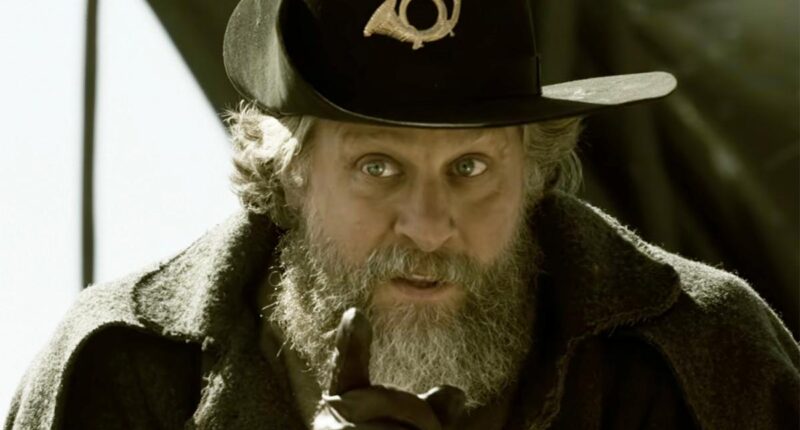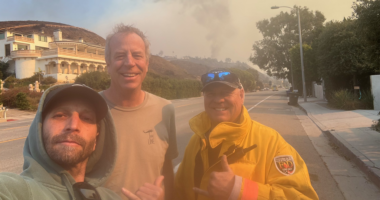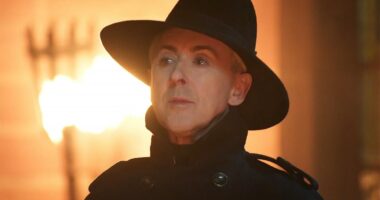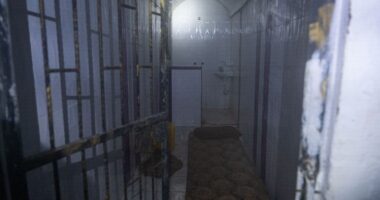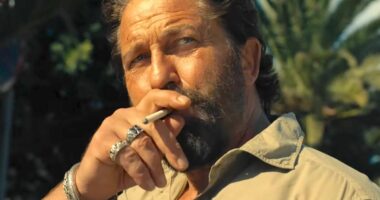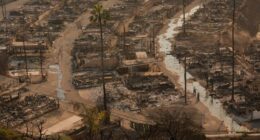The women are experiencing a horrific moment as their throats are slit one by one. They are crying out, screaming, and calling out names as the gruesome act unfolds. Bound together, each woman witnesses the fate of the one next to her, knowing that she will be next.
Amidst this chaos, one woman, Abish Pratt, is spared from the gruesome fate. Red Feather, the leader of the ruthless warriors responsible for the massacre, decides to keep Abish alive. It remains a mystery why Red Feather chooses to spare her. It could be her courage in the face of death or simply his attraction to her. Nonetheless, Abish, along with her husband Jacob who survived a partial scalping, manages to survive, a rare occurrence in this unforgiving world.
The introduction sets the tone for the level of violence depicted in “American Primeval.” The brutality portrayed in the narrative is not just thrilling but also unsettling. The setting, characterized by a sense of desolate filthiness, features a multitude of rough characters from various factions engaged in a relentless battle for territory. The sheer cruelty and bloodshed in the story invoke a comparison to the dark and gritty nature of “Game of Thrones” rather than the more serene vibe of “Yellowstone.” In a way, it could be dubbed “YellowThrones,” a blend that I consider a commendation.
This episode fleshes out the world these characters inhabit, as well as the lives some of them have led. The key figure here is Isaac, the tracker who rescued Sara Holloway and her son Devin from certain death at the hands of the Mormon militia the Nauvoo Legion and their indigenous allies. He wants to bring them back to Fort Bridger, where he believes they’ll be safe, or at least safer than they would be trying to make it across hotly contested territory to the ass end of nowhere to meet a man that even Devin is less than convinced wants to see them in the first place.
Coming along for the ride is Two Moons, the native girl who violently escaped her abusive father and stowed away in the Holloways’ wagon. Though mute because her tongue has been cut out (I’m sure we’ll learn more about this later), she proves to be an invaluable companion, helping Sara and Devin survive when Isaac isn’t around and tagging along even after Isaac tells her to leave. He doesn’t seem to have the heart to force her to leave, which is telling.
What he does have is the combat prowess of Wolverine or Aragorn or the Hound, you know, someone of that nature. When the group stumbles across some fur trappers and Sara unwisely reveals herself, they’re nearly captured and handed over for the price on her head. Instead, Isaac kills the entire party single-handedly in a maelstrom of guns and knives and axes.
He doesn’t escape unscathed, but that winds up working out alright for our foursome. They’re taken in by the same Shoshone tribe that, apparently, tutored Isaac in their language, customs, and fighting style — right alongside Red Feather, whose mother, Winter Bird (Irene Bedard), is the Chief, and raised both men when they were young. But Red Feather since broken away from the rest of his people to wage a war all his own, at the head of his own renegade sub-tribe, Wolf Clan.
When the army, led by the seemingly on-the-up-and-up Captain Dellinger (Lucas Neff), pay the Chief’s village a visit, the tribe hides the visitors. But Dellinger isn’t really out to give any indigenous people a hard time at the moment. He knows that Mormons, not Native Americans, were responsible for the settler massacre last episode. Dellinger’s main interest is getting to the bottom of it all before the Nauvoo Legion can cover it up.
That should be easy enough for the Legion to pull off. Jacob Pratt, one of the few survivors of the slaughter, has no idea his co-religionists were responsible to begin with. Now he’s working with the Legion to find his wife, placing them both in the hands of their would-be executioners if they’re reunited. I don’t think either Jacob or Abish will live very long if the Mormon militia tracks her down before the Army does — not while Brigham Young (Kim Coates), their priest-king, is out there issuing orders to sever any loose ends.
Director Peter Berg has a knack for depicting the inherent sternness of all this. The determined faces of actors Betty Gilpin and Taylor Kitsch and Saura Lightfoot Leon as Sara and Isaac and Abish. The leaders of the Church of Latter-Day Saints, gathered around a campfire, silhouetted agains the big sky. Our four heroes captured with a low angle that makes them look like the Fellowship of the Ring. Rolling vistas and billowing mists. Forests and scrubland. Hard people in a hard land. It’s solid stuff.
What it isn’t is unique, special, or even particularly provocative beyond the in-your-face violence. If that sounds harsh, I don’t mean it to be — it’s just the way it is. American Primeval is a bloody modern Western, and that’s about the extent of it. If you like this sort of thing, this is the sort of thing you’ll like. But unlike Brigham Young, this show isn’t making any converts just yet.
Sean T. Collins (@theseantcollins) writes about TV for Rolling Stone, Vulture, The New York Times, and anyplace that will have him, really. He and his family live on Long Island.
(function(d, s, id) {
var js, fjs = d.getElementsByTagName(s)[0];
if (d.getElementById(id)) return;
js = d.createElement(s); js.id = id;
js.src = “//connect.facebook.net/en_US/sdk.js#xfbml=1&appId=823934954307605&version=v2.8”;
fjs.parentNode.insertBefore(js, fjs);
}(document, ‘script’, ‘facebook-jssdk’));
